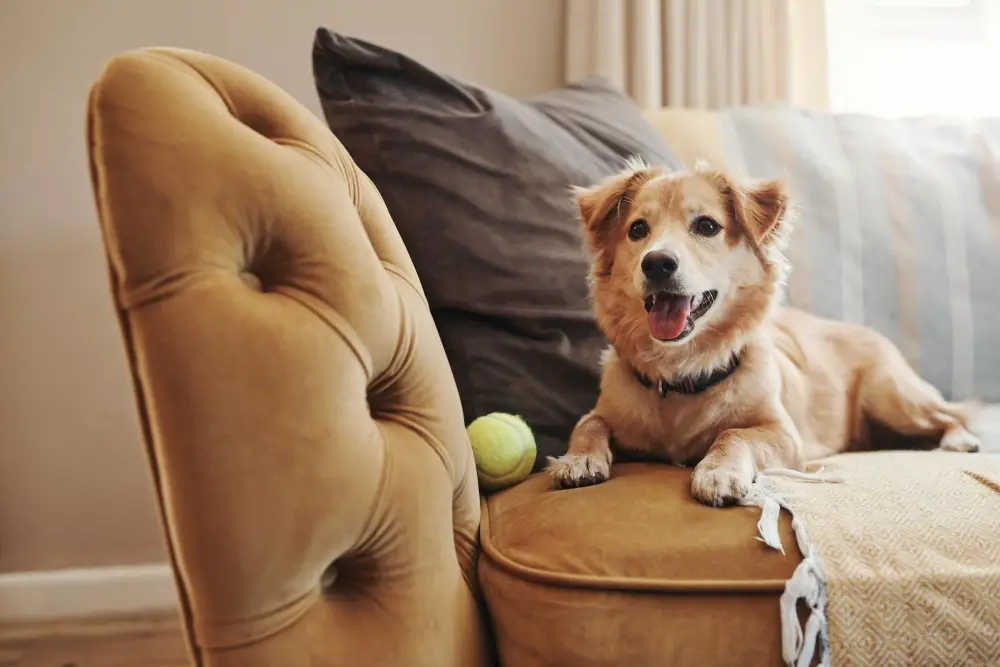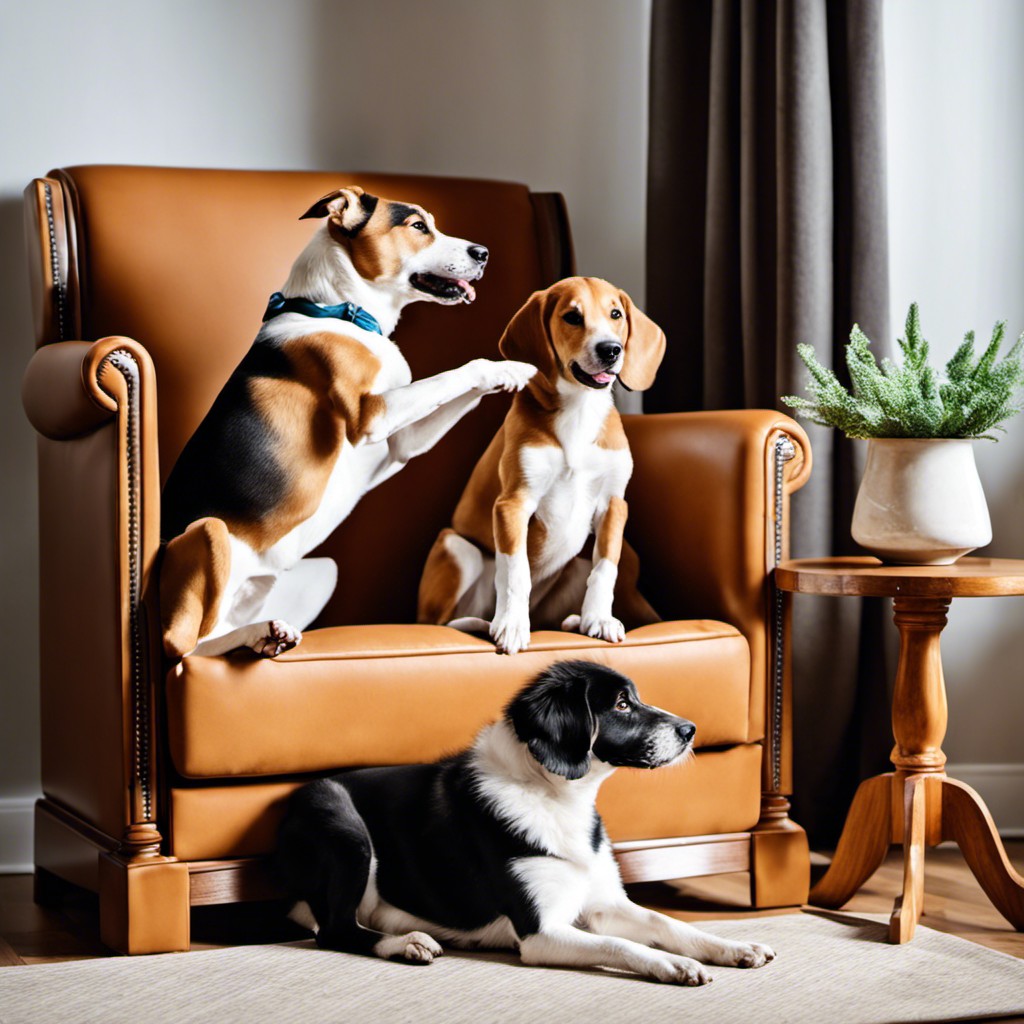Last updated on
Unravel the secrets behind your dog’s quirky behavior of couch-licking in our comprehensive guide, targeted to give you a clear understanding of this canine mystery.
Key takeaways:
- Dogs may lick furniture due to food residue, texture, scent marking, or comfort.
- Licking furniture can indicate boredom, anxiety, or self-soothing behavior in dogs.
- Health issues like nutritional deficiencies or dental problems can prompt licking.
- Certain breeds or ages may be more prone to furniture licking.
- Persistent licking may require veterinary attention for underlying issues.
Table of Contents
Common Reasons Dogs Lick Furniture
Dogs exhibit a range of behaviors, with couch licking stemming from various causes. One possibility is the presence of food residue or scents that attract your pet, enticing them to taste the surface. Alternatively, they might enjoy the texture of the couch material, engaging in the behavior out of sheer pleasure. Scent marking is another rationale, where your dog uses licking as a means to deposit their scent and establish territory. Additionally, licking releases endorphins in dogs, providing a sense of comfort and calm, which could explain why they might lick furniture habitually.
Boredom and Anxiety in Dogs
Dogs often turn to licking as a self-soothing activity that helps them cope with feelings of restlessness or unease. When left alone for extended periods or not provided with sufficient physical and mental stimulation, they might resort to repetitive behaviors such as licking furniture to pass time and alleviate their boredom or anxiety. This habit is akin to humans engaging in fidgeting or nail-biting when anxious or restless.
To counteract this, enriching a dog’s environment with engaging toys or puzzle feeders can keep their minds active and reduce the likelihood of such behaviors. Consistent exercise and playtime are crucial for releasing pent-up energy and keeping stress at bay. For dogs with separation anxiety, establishing a comforting routine before leaving the house can help ease their stress. Consider crate training, as many dogs find the enclosed space of a crate comforting when their owners are away.
Health Issues and Compulsive Behaviors
Certain health concerns can prompt dogs to engage in excessive licking. Nutritional deficiencies, for instance, might lead them to seek out odd substances to rebalance their system. If your dog lacks certain minerals or vitamins, they may be drawn to the taste or texture of your couch.
Compulsive behaviors can also manifest in dogs, similar to humans. Stress or past traumas can trigger these compulsive actions, which include repetitive licking. This might be an attempt to soothe themselves; the act of licking releases endorphins which can help calm a dog’s nerves.
Some dogs might lick surfaces due to medical issues like digestive problems or nausea. Often, gastrointestinal discomfort can lead to increased saliva production and the urge to lick. If accompanied by other symptoms such as vomiting, lethargy, or changes in appetite, immediate veterinary attention is recommended.
Finally, oral discomfort, including teething in puppies or dental issues in older dogs, can prompt licking as they try to alleviate gum or tooth pain. Regular dental check-ups can help prevent such problems from developing into persistent behaviors.
Influence of Breed and Age
Certain breeds, such as Labrador Retrievers and Golden Retrievers, are known for their oral fixations, which can manifest as increased licking. These breeds often explore the world with their mouths and may be more prone to licking furniture as part of their natural behavior.
Puppies and younger dogs may lick more frequently as they are still exploring and learning about their environment. They may lick objects, including couches, out of curiosity or during teething phases.
On the other hand, older dogs may develop the habit of licking surfaces due to age-related cognitive decline. As dogs age, they may exhibit changes in behavior, including licking, which can be attributed to confusion or memory issues.
It’s worth noting that while breed and age may influence licking behaviors, each dog is an individual, and patterns may vary widely among dogs of the same breed or age group.
When to Consult a Veterinarian
If occasional couch licking evolves into a persistent habit, it might signal underlying health issues. Look out for these signs that merit professional attention:
- Excessive drooling or mouth pain: This could indicate dental problems or gastrointestinal upset.
- Concurrent signs of illness: Lethargy, vomiting, or changes in appetite accompanying the licking behavior.
- Intensification of licking: Sudden increases in frequency or duration of licking could point towards developing compulsions or discomfort.
A veterinarian can rule out medical causes, provide guidance on behavioral interventions, or refer you to a veterinary behaviorist if needed. Early intervention often leads to better outcomes, so timely veterinary consultation is crucial for your dog’s health and well-being.
FAQ
Why is my dog licking my sofa?
Your dog might be licking the sofa due to stress, loneliness, or boredom, as this behavior releases endorphins, helping your pet to self-soothe, but if not managed, this occasional response could turn into a habit.
What does it mean when a dog licks fabric?
Dogs frequently lick fabric due to an upset stomach, and this particular behavior may also allude to potential dietary issues that require consultation with a veterinarian.
Should I let my dog lick furniture?
While occasional licking might seem harmless, frequent furniture licking by dogs, often caused by separation anxiety, can turn into a challenging-to-correct compulsive behavior.
Why does my dog lick fabric and carpet?
Dogs often lick fabric and carpet as a way to relieve stress, communicate, or manage discomforts associated with potential health issues like gastrointestinal problems or nausea.
How can I stop my dog from incessantly licking the furniture?
Training your dog, providing chew toys and applying taste deterrents on the furniture can effectively prevent your dog from incessantly licking the furniture.
Is it normal for puppies to lick couches and other types of furniture?
Yes, it is normal for puppies to lick couches and other types of furniture as it’s a part of their exploring process, though it can often indicate anxiety, boredom, or a dietary deficiency.
Could there be health implications if my dog constantly licks the fabric surfaces at home?
Yes, there could be health repercussions if your dog continuously licks fabric surfaces at home as it may ingest harmful microorganisms or chemicals present on the material.
You may also like to read:


